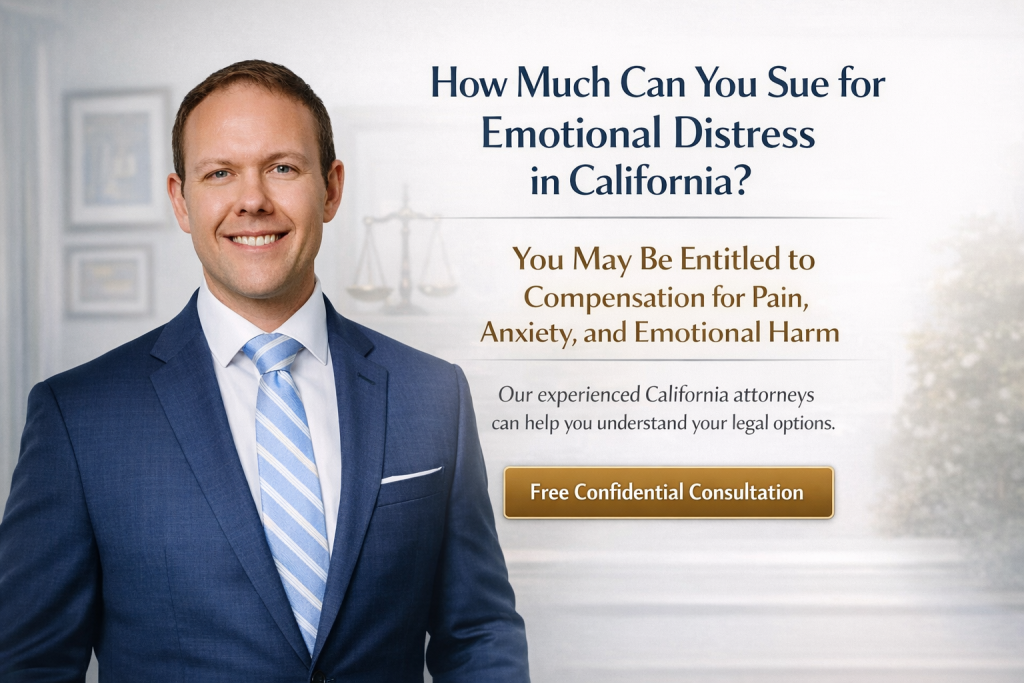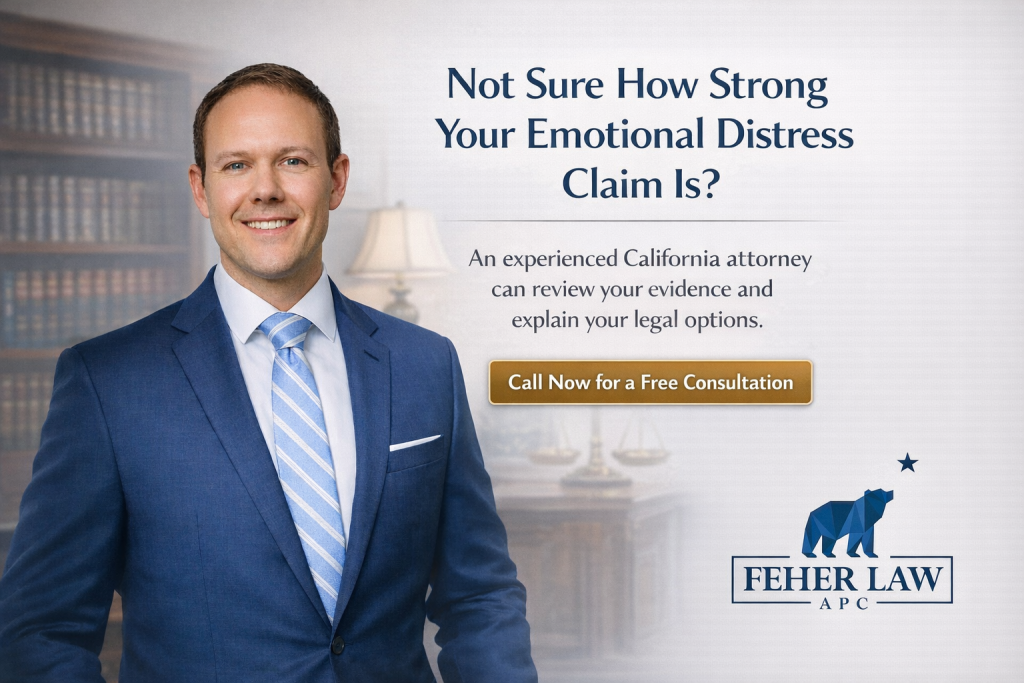How Much Can I Sue For Emotional Distress in California?

You can sue for emotional distress in California, but compensation varies widely—from a few thousand dollars for mild, short-term emotional harm to hundreds of thousands or more for severe, long-lasting conditions like PTSD.
At Feher Law, we see emotional distress payouts depend heavily on the severity of symptoms, how deeply the trauma impacts your daily life, the strength of medical and therapy records, applicable state laws, and the quality of legal representation, with the highest awards often tied to permanent psychological damage and related economic losses.
If you’re struggling with emotional trauma and want clarity on your legal options, speak with a Torrance Personal Injury Lawyer who understands how to properly value these claims.
Call (866) 646-6676 today for a free consultation and let Feher Law help you pursue the full compensation you deserve.
What Is Emotional Distress?
Emotional distress refers to serious mental and emotional suffering caused by another person’s actions, often described as mental anguish or psychological trauma. Unlike ordinary stress or frustration, emotional distress involves symptoms that substantially interfere with your daily life, emotional stability, or ability to function normally, with the severity of the emotional harm playing a critical role in how these claims are evaluated.
Common signs of emotional distress include:
- Post-traumatic stress disorder (PTSD)
- Anxiety or panic attacks
- Depression or severe mood changes
- Chronic stress or emotional instability
- Insomnia or sleep disturbances
- Anger, fear, or emotional withdrawal
In severe cases, emotional distress can be so debilitating that it requires long-term therapy, medication, or ongoing mental health treatment.
Emotional Distress in California Legal Cases
From a legal standpoint, California law recognizes emotional distress as a compensable injury when it results from negligent, reckless, or intentional conduct. In emotional distress lawsuits, physical injury is not always required, but the severity of the emotional suffering must be supported by credible evidence showing a meaningful impact on your life.
When filing an emotional distress claim, courts commonly consider:
- Medical or psychological diagnoses
- Therapy and treatment records
- Testimony describing behavioral or lifestyle changes
- Workplace, financial, or relationship impacts
- The consistency and credibility of supporting evidence
If you’re experiencing emotional harm at work, you may also be asking, “what can I sue my employer for?” California courts recognize that emotional suffering caused by harassment, discrimination, retaliation, or other misconduct can be just as damaging as physical injuries and may entitle victims to compensation when properly proven.
Can I sue my employer for emotional distress?
Yes, employees in California can sue for emotional distress if it’s linked to wrongful workplace conduct such as harassment, discrimination, or retaliation. California law recognizes two primary types of emotional distress claims: intentional infliction of emotional distress and negligent infliction of emotional distress.
- Intentional infliction occurs when someone’s actions are deliberate and outrageous
- Negligent infliction happens when someone fails to use reasonable care, causing psychological harm.
The California Civil Rights Department investigates these workplace claims and can provide resources for affected employees.
💡 Hypothetical Scenario: An employee was subjected to daily verbal abuse and humiliation by a supervisor after reporting discriminatory practices in the workplace. After developing severe anxiety and depression requiring medical intervention, the employee filed a lawsuit claiming intentional infliction of emotional distress, resulting in a substantial settlement.
How much can you sue for emotional distress?
The value of emotional distress damages in California varies widely depending on the severity of harm, the evidence available, and circumstances of the case. The legal system categorizes emotional suffering based on its impact on your daily life.
⚖️ The table below shows potential compensation ranges based on the severity of emotional distress:
| Severity Level | Symptoms | Typical Compensation Range |
|---|---|---|
| Mild | Temporary anxiety, stress, and sleep disturbances | $5,000 – $10,000 |
| Moderate | Requiring therapy, temporary lifestyle changes | $15,000 – $75,000 |
| Severe | PTSD, major depression, ongoing treatment needed | $100,000 – $500,000+ |
Mild (short-term anxiety)
Compensation for mild emotional distress in California typically falls between $5,000 and $10,000. These cases involve temporary symptoms like short-term anxiety, minor sleep disturbances, or brief periods of emotional distress that resolve relatively quickly.
📌Evidence in these cases often includes minimal medical documentation, perhaps a few visits to a primary care physician or brief counseling sessions. The impact on daily activities is usually limited and short-lived.
Moderate (therapy needed)
Awards for moderate emotional suffering commonly range from $15,000 to $75,000 in the California legal system. Such cases feature documented therapy requirements, medication prescriptions, and noticeable impacts on daily functioning.
People experiencing moderate emotional distress might need regular psychological counseling for several months, have temporary work limitations, and show clear evidence of lifestyle disruptions. Medical records typically reflect consistent treatment with mental health professionals.
Severe (PTSD, ongoing care)
Settlements for severe emotional distress can reach $100,000 to $500,000 or higher when permanent psychological damage is evident. Cases at this level involve diagnosed conditions like PTSD, major depression, or anxiety disorders requiring extensive professional intervention.
📌Victims with severe emotional trauma often need long-term psychiatric care, medication management, and may experience permanent changes to their quality of life. Expert testimony from mental health professionals becomes vital in substantiating these significant compensation amounts.
Ready to understand your options? If you’re facing emotional distress due to workplace issues, our Huntington Beach employment lawyer is here to help. We offer free consultations to discuss your case and explore the compensation you may be entitled to.
What is the most you can sue for emotional distress in California?
There is no legal cap on emotional distress damages in California private sector cases.
However, when suing a government entity under the California Tort Claims Act, your ability to recover certain types of damages may be limited, and strict procedural rules apply — including a six-month deadline to file an administrative claim.
In private sector claims where there are no statutory limits, emotional distress compensation is determined by jury verdicts and negotiated settlements.
California courts have awarded multi-million dollar verdicts in extreme cases involving severe psychological trauma, particularly when the defendant’s conduct was especially egregious. The highest awards typically involve cases where intentional infliction of emotional distress occurs with malice or gross negligence.
💡Hypothetical Scenario: A senior executive was subjected to systematic racial discrimination and public humiliation by company leadership, resulting in diagnosed PTSD, clinical depression, and multiple hospitalizations. After providing extensive medical documentation and expert testimony, the executive was awarded $2.8 million for emotional distress damages, reflecting the extreme and intentional nature of the harm caused.

Calculating an average payout for emotional distress in California
Emotional distress often plays a major role in the value of pain and suffering damages in California personal injury lawsuits and is commonly estimated using two methods:
- Multiplier method – Total economic damages, such as medical bills, lost income, and future costs, are multiplied by 1.5 to 5 based on the severity and duration of emotional harm
- Per diem method – A daily dollar amount is assigned to emotional suffering and multiplied by the length of recovery
Because emotional distress often involves non-economic losses, stronger documentation—such as therapy records, psychiatric evaluations, and evidence showing how the trauma affects daily life—can significantly increase compensation.
Our pain and suffering calculator applies these general principles by using your economic damages and a severity multiplier to generate an estimated range.
⚠️ Disclaimer: This calculator provides estimates for informational purposes only and does not constitute legal advice. Actual compensation depends on the facts of your case, applicable California law, and available evidence.
Selected Value: 0%
For an accurate case-specific evaluation, a Torrance Personal Injury Lawyer at Feher Law can review liability, evidence, and comparable California verdicts—call (866) 646-6676 for a free, confidential consultation.
Factors that affect the emotional distress settlement value
Several key factors influence how much you can recover when suffering from emotional distress, and California courts evaluate both the seriousness of the harm and the strength of the supporting evidence. Because the law allows recovery for emotional harm even without physical injury in many situations, the severity, duration, and real-world impact of your condition play a major role in determining settlement value.
Key factors that affect claims for emotional distress include:
- Severity and duration of symptoms – Chronic or long-term conditions like PTSD or major depression typically result in higher compensation than temporary anxiety
- Impact on daily life – Emotional distress that interferes with work, relationships, or overall enjoyment of life increases potential recovery
- Quality of evidence – Medical records, therapy notes, psychiatric diagnoses, expert testimony, personal journals, and witness statements are critical
- Economic losses – Medical bills, therapy costs, prescription expenses, and lost wages may be recovered in addition to emotional damages
- Defendant’s conduct – Intentional, reckless, or outrageous behavior often leads to higher awards than ordinary negligence
- Physical manifestations – Symptoms such as insomnia, weight loss, panic attacks, or chronic stress help make emotional suffering more measurable
- Credibility of testimony – Consistent and believable accounts from you and supporting witnesses strengthen emotional distress claims
- Pre-existing conditions – Prior mental health issues may affect compensation unless clear evidence shows the incident worsened your condition
- Legal factors – State laws, potential damage limitations, and the experience of your attorney all influence final settlement outcomes
Your evidence makes the biggest difference—without strong medical documentation or consistent therapy records, claims for emotional distress are far more difficult to maximize under California law.
How much does it cost to sue someone for emotional distress?
We prioritize fee transparency and work primarily on contingency for emotional distress claims, meaning you pay nothing upfront. We’ll clearly outline all potential expenses during your initial consultation, ensuring you understand the financial aspects of your case.
The following is a general breakdown of common litigation costs in California personal injury cases — these are not necessarily our fees, but examples of what may arise depending on the nature of your claim:
- Court Filing Fees: Approximately $435-$500 to initiate a civil lawsuit in California Superior Court
- Process Service Costs: $50-$100 to formally serve legal documents to defendants
- Expert Witness Fees: $300-$600+ per hour for psychologists or psychiatrists to testify about your condition
- Deposition Expenses: $1,500-$5,000+ for transcripts and video recordings of witness testimony
- Medical Record Collection: $200-$500 for obtaining and organizing treatment documentation
- Attorney Fees: Typically contingency-based (25-40% of recovery) for personal injury cases
🔗 For specific filing fee information, you can visit the California Courts Self-Help Center website, which provides updated court cost information.

How we prove emotional distress in a California lawsuit
Building a compelling emotional distress case requires comprehensive evidence that demonstrates both the existence and impact of your psychological suffering:
- Medical records documenting diagnosis and treatment
- Therapy notes showing consistency of symptoms
- Testimony from family members about behavioral changes
- Employment records indicating performance impacts
- Personal journals chronicling day-to-day experiences
- Expert testimony from mental health professionals
- Before-and-after evidence of lifestyle changes
- Photographic or video evidence (when applicable)
⚖️The American Psychiatric Association’s Diagnostic and Statistical Manual (DSM-5) plays a key role in California emotional distress cases. This standardized classification system helps diagnose and categorize mental health conditions, providing courts with medically recognized criteria for evaluating psychological injuries.
When mental health professionals reference specific DSM-5 diagnostic codes in their testimony, it lends scientific credibility to emotional distress claims that might otherwise seem subjective.
How we help clients seek fair compensation for emotional distress
At Feher Law, we understand that emotional distress extends far beyond momentary discomfort—it can fundamentally alter your quality of life. Our approach to these sensitive cases combines legal expertise with genuine compassion for what you’re experiencing.
We meticulously document all aspects of your emotional suffering, working closely with mental health professionals to establish clear connections between the defendant’s actions and your psychological harm. Our team stays current with recent California case verdicts to accurately value your claim and negotiate from a position of strength.
The statute of limitations for emotional distress claims in California is generally two years from the incident, though workplace cases may have different deadlines. Our experienced team ensures all filings meet these critical deadlines while building the strongest possible case for maximum compensation.
If you’re wondering what kind of lawyer do I need to sue an employer, you don’t have to suffer silently—our legal team is ready to help you seek justice for the emotional trauma you’ve endured.
Contact us online or call 866-646-6676 for a free consultation. Our team at Feher Law is ready to listen, advocate for your rights, and help you pursue the full compensation you deserve for your emotional distress.

Final points on how much money you can sue for pain and suffering
📌Successfully pursuing an emotional distress claim requires understanding that California law recognizes the severe impact psychological suffering can have on your life. Whether you’ve experienced workplace harassment, an accident, or intentional harm, documentation is critical to establishing your claim’s value.
📌The severity of your emotional distress directly influences potential compensation, with documented therapy, medication, and lifestyle changes supporting higher settlements. Working with our experienced California personal injury lawyer significantly improves your chances of receiving fair compensation that accounts for both past suffering and future care needs.
📌Remember that emotional distress claims have strict filing deadlines and specific evidence requirements. Consulting with our qualified attorney as soon as possible after the incident ensures your rights are protected and your case is built on the strongest possible foundation.
FAQs
Can I sue for emotional distress without physical injury in California?
Yes, you can successfully sue for emotional distress without physical injury in California through an intentional infliction claim. The law requires proving the defendant’s conduct was outrageous, intentional, or reckless, and caused severe emotional harm. Courts typically look for medical documentation of psychological symptoms and their impact on your daily functioning.
What is the statute of limitations for emotional distress claims in California?
The statute of limitations for personal injury cases, including emotional distress, is typically two years from the date of injury in California. However, employment-related emotional distress claims may fall under different timeframes—one year for DFEH complaints and three years for certain Labor Code violations. Missing these deadlines can permanently bar your right to compensation.
How can I prove emotional distress in court?
To prove emotional distress in court, provide medical records from therapists or psychiatrists, testimony about lifestyle changes, witness statements about behavioral differences, and evidence of lost opportunities or relationships. California courts look for objective evidence of subjective suffering, so documentation from mental health professionals significantly strengthens your case and helps quantify damages.
Can I sue my employer for a hostile work environment causing emotional distress?
You can sue your employer if a hostile work environment caused significant emotional suffering through pervasive harassment, discrimination, or retaliation. California law requires filing with the Civil Rights Department within three years before pursuing a lawsuit. Documentation of the hostile behavior and how it specifically caused your emotional distress is essential for these claims.
How can Feher Law help with my emotional distress claim?
Our team provides comprehensive support for emotional distress claims, starting with a free consultation to evaluate your case. We handle all legal processes, gather supporting evidence, consult with medical experts, negotiate with opposing parties, and represent you in court if necessary.
Our contingency fee structure means you pay nothing unless we secure compensation for your suffering.
Related Posts


Woman Killed in Sylmar Crash on 210 Freeway

One killed in Montebello crash on Pomona Freeway

Facial Scarring Compensation Calculator in California

Man Killed in Norwalk Freeway Transition Crash






